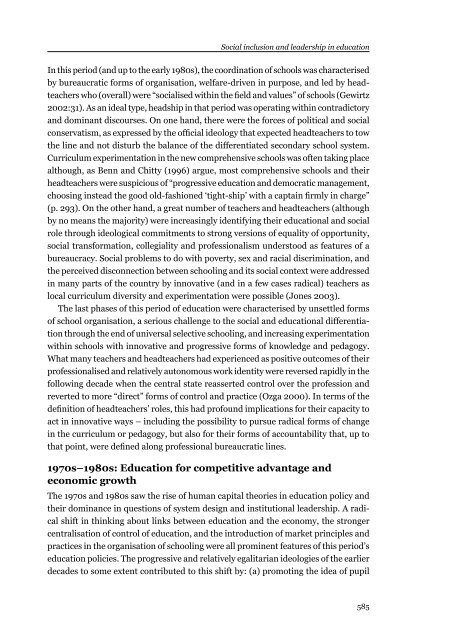Social inclusion and leadership in education: An evolution of roles ...
Social inclusion and leadership in education: An evolution of roles ...
Social inclusion and leadership in education: An evolution of roles ...
- No tags were found...
Create successful ePaper yourself
Turn your PDF publications into a flip-book with our unique Google optimized e-Paper software.
<strong>Social</strong> <strong><strong>in</strong>clusion</strong> <strong>and</strong> <strong>leadership</strong> <strong>in</strong> <strong>education</strong>In this period (<strong>and</strong> up to the early 1980s), the coord<strong>in</strong>ation <strong>of</strong> schools was characterisedby bureaucratic forms <strong>of</strong> organisation, welfare-driven <strong>in</strong> purpose, <strong>and</strong> led by headteacherswho (overall) were “socialised with<strong>in</strong> the field <strong>and</strong> values” <strong>of</strong> schools (Gewirtz2002:31). As an ideal type, headship <strong>in</strong> that period was operat<strong>in</strong>g with<strong>in</strong> contradictory<strong>and</strong> dom<strong>in</strong>ant discourses. On one h<strong>and</strong>, there were the forces <strong>of</strong> political <strong>and</strong> socialconservatism, as expressed by the <strong>of</strong>ficial ideology that expected headteachers to towthe l<strong>in</strong>e <strong>and</strong> not disturb the balance <strong>of</strong> the differentiated secondary school system.Curriculum experimentation <strong>in</strong> the new comprehensive schools was <strong>of</strong>ten tak<strong>in</strong>g placealthough, as Benn <strong>and</strong> Chitty (1996) argue, most comprehensive schools <strong>and</strong> theirheadteachers were suspicious <strong>of</strong> “progressive <strong>education</strong> <strong>and</strong> democratic management,choos<strong>in</strong>g <strong>in</strong>stead the good old-fashioned ‘tight-ship’ with a capta<strong>in</strong> firmly <strong>in</strong> charge”(p. 293). On the other h<strong>and</strong>, a great number <strong>of</strong> teachers <strong>and</strong> headteachers (althoughby no means the majority) were <strong>in</strong>creas<strong>in</strong>gly identify<strong>in</strong>g their <strong>education</strong>al <strong>and</strong> socialrole through ideological commitments to strong versions <strong>of</strong> equality <strong>of</strong> opportunity,social transformation, collegiality <strong>and</strong> pr<strong>of</strong>essionalism understood as features <strong>of</strong> abureaucracy. <strong>Social</strong> problems to do with poverty, sex <strong>and</strong> racial discrim<strong>in</strong>ation, <strong>and</strong>the perceived disconnection between school<strong>in</strong>g <strong>and</strong> its social context were addressed<strong>in</strong> many parts <strong>of</strong> the country by <strong>in</strong>novative (<strong>and</strong> <strong>in</strong> a few cases radical) teachers aslocal curriculum diversity <strong>and</strong> experimentation were possible (Jones 2003).The last phases <strong>of</strong> this period <strong>of</strong> <strong>education</strong> were characterised by unsettled forms<strong>of</strong> school organisation, a serious challenge to the social <strong>and</strong> <strong>education</strong>al differentiationthrough the end <strong>of</strong> universal selective school<strong>in</strong>g, <strong>and</strong> <strong>in</strong>creas<strong>in</strong>g experimentationwith<strong>in</strong> schools with <strong>in</strong>novative <strong>and</strong> progressive forms <strong>of</strong> knowledge <strong>and</strong> pedagogy.What many teachers <strong>and</strong> headteachers had experienced as positive outcomes <strong>of</strong> theirpr<strong>of</strong>essionalised <strong>and</strong> relatively autonomous work identity were reversed rapidly <strong>in</strong> thefollow<strong>in</strong>g decade when the central state reasserted control over the pr<strong>of</strong>ession <strong>and</strong>reverted to more “direct” forms <strong>of</strong> control <strong>and</strong> practice (Ozga 2000). In terms <strong>of</strong> thedef<strong>in</strong>ition <strong>of</strong> headteachers’ <strong>roles</strong>, this had pr<strong>of</strong>ound implications for their capacity toact <strong>in</strong> <strong>in</strong>novative ways – <strong>in</strong>clud<strong>in</strong>g the possibility to pursue radical forms <strong>of</strong> change<strong>in</strong> the curriculum or pedagogy, but also for their forms <strong>of</strong> accountability that, up tothat po<strong>in</strong>t, were def<strong>in</strong>ed along pr<strong>of</strong>essional bureaucratic l<strong>in</strong>es.1970s–1980s: Education for competitive advantage <strong>and</strong>economic growthThe 1970s <strong>and</strong> 1980s saw the rise <strong>of</strong> human capital theories <strong>in</strong> <strong>education</strong> policy <strong>and</strong>their dom<strong>in</strong>ance <strong>in</strong> questions <strong>of</strong> system design <strong>and</strong> <strong>in</strong>stitutional <strong>leadership</strong>. A radicalshift <strong>in</strong> th<strong>in</strong>k<strong>in</strong>g about l<strong>in</strong>ks between <strong>education</strong> <strong>and</strong> the economy, the strongercentralisation <strong>of</strong> control <strong>of</strong> <strong>education</strong>, <strong>and</strong> the <strong>in</strong>troduction <strong>of</strong> market pr<strong>in</strong>ciples <strong>and</strong>practices <strong>in</strong> the organisation <strong>of</strong> school<strong>in</strong>g were all prom<strong>in</strong>ent features <strong>of</strong> this period’s<strong>education</strong> policies. The progressive <strong>and</strong> relatively egalitarian ideologies <strong>of</strong> the earlierdecades to some extent contributed to this shift by: (a) promot<strong>in</strong>g the idea <strong>of</strong> pupil585

















